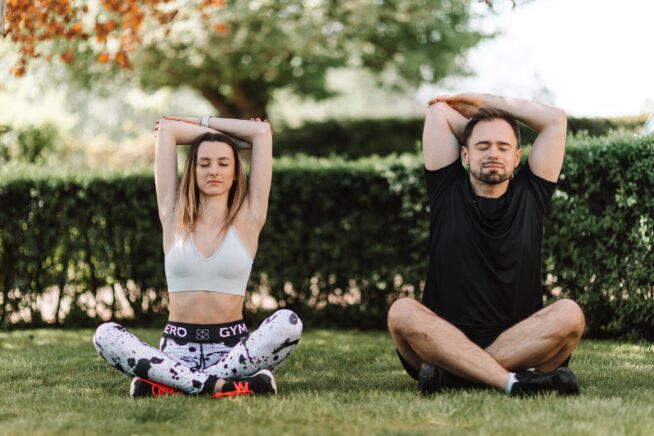When I was a yoga teacher, one of the questions I was most often asked by students sounded something like, “How do I convince my husband to start doing yoga? I know he needs it!”
The answer is deceptively simple and yet not what people want to hear:
“You don’t.”
They would then ask my how I convinced my own partner to start doing yoga.
They were stunned when I’d say simple, “I didn’t. He doesn’t practice.”
I taught yoga for a living, and my own partner didn’t practice?! If I couldn’t convince him, what hope was there for anyone else? But the missing piece was this: I never tried to convince him.
I did my practice, taught my classes, and left him alone about it.
I understand the impulse. It comes from a heartfelt place most of the time. And yet,
You experienced something that created a positive impact in your life. Once you experience these benefits, you want to share the cause of those benefits with someone else.
This could go for anything. Whether it’s starting a journaling practice, drinking green juice, meditating, decluttering, a particular piece of home-cycling equipment—whatever it is that’s lighting you up these days, my advice is to go out of your way not to convince other people to try it.
In fact, my even better advice is not to talk about it for longer than three sentences.
Why?
Because convincing other people of anything usually doesn’t work.
If you’ve been on the Internet lately, you may have seen that usually political arguments end with both parties digging their heels in even deeper. If you’re stuck in a space of trying to convince someone that they need to be doing something (like yoga, but it could be anything), you’re trying to change them.
Which means that they’re likely not to feel loved or accepted in that moment. It leads to defensiveness, no matter how well-meaning your argument or how sure you are their life would be better.
Most people believe that they’re fine. And if they believe that they’re fine, they aren’t looking for the thing that you went looking for. It sound callous, but they may need to have a real problem before they’re ready to seek a solution.
The best thing to do is clean up your side of the street.
I’m pretty sure none of us is perfect (I’m certainly not!), so it’s unlikely that there’s no more work for us to on our journeys.
Recently, I’ve been on a laser-focused decluttering mission in my house. I’ve given away more than a hundred kitchen items, dozens of books, and piles of clothes that I hadn’t worn in ages. My spare moments have been filled with trips to donate or sell things, and to organize the rest.
I’ve been reading a lot of blogs and books about minimalism and a similar question pops up a lot there as well. “How do I convince my partner or family to try minimalism or declutter?” And the answer there is the same: you don’t.
Clean up your side of the bedroom. Tidy up your side of the closet. Declutter your things from the living room and dining room. And then let others see how much less stressed you are or how you spend less time looking for your things.
You don’t have to go door to door with your latest obsession.
Like a lighthouse, the light that your new practice brings to your life will shine without you having to do a thing. People will notice. And if your loved ones want more information, they’ll ask you.
A couple of years ago, after more than a decade of partnership, more than five years of marriage, and a child together, my husband surprised me. After breakfast one morning, he asked: “Could you lead me through some yoga this morning? I think it might help my lower back.”
I didn’t say anything except, “Sure!” and we’ve now been doing yoga together almost every morning for more than three years. I’m certain that if I’d set my mind to it, I could have gotten him on his mat earlier than that, but it was so much more pleasant accepting him as he was—and then realizing I’d been playing the long game. I didn’t roll my eyes and say, “Finally!” I just led us both through some poses.
I had realized years earlier that what was important to me was not that he does—or doesn’t—do yoga. It doesn’t actually impact my life at all. I love and accept who he is completely. But the whole time, he’d been watching me. And when the time was right, he knew where to turn for help.
At the end of the day, my very best advice is to simply keep doing whatever it is that’s creating enormous benefit for you. And then let the results speak for themselves.
Christy Tending is an activist, educator, and writer. She teaches online courses about sustainable self-care to students all over the world, and hosts the podcast Tending Your Life. She lives on occupied Ohlone territory (Oakland, CA) with her family. You can learn more about her work at www.christytending.com.
Image courtesy of Karolina Grabowska.












